Redditor Rehomes Late Father-In-Law's Dog and Provokes a Family Dispute
Losing a loved one can be one of the most difficult experiences a person can face. When we lose someone close to us, we often cling to the things that remind us of them, whether it be a cherished heirloom or a beloved pet.
However, it's important to remember that our personal attachment to these things doesn't always mean we are capable of providing the best care for them. This was the dilemma faced by OP, who inherited her late father-in-law's dog.
Despite her love for her father-in-law, OP knew that she and her husband were not equipped to provide proper care for the dog. The dog was poorly trained, destructive, and posed a danger to those around it. Rather than let the dog suffer, OP made the difficult decision to rehome it.
OP's father-in-law passed away and left behind a poorly behaved dog. OP's brother-in-law (BIL) tried to pressure OP and her husband into taking the dog, but they refused due to their small living space and long work hours.
BIL took the dog but neglected to train or rehome it. OP found a rehabilitation center 1,000 miles away that was willing to take the dog and followed their guidelines to ensure the dog's well-being.
BIL was angry when he found out and accused OP of lying about the dog's whereabouts. Despite their efforts to improve the dog's situation, OP's husband's family believes they should have consulted with BIL before rehoming the dog and wants them to bring the dog back to "make things right."
Read the full story below:
OP asks:

Her FIL died, leaving a dog
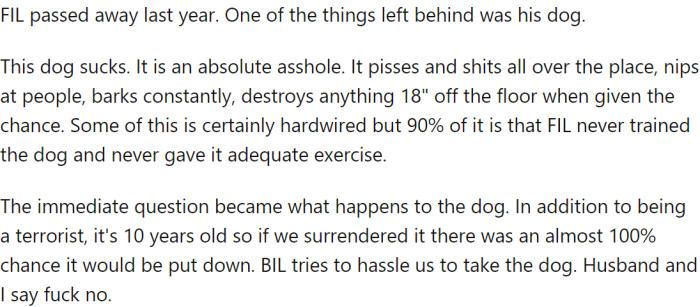
The dog is poorly trained

Grief and Its Impact on Decision Making
Grief can profoundly impact decision-making, often leading individuals to act in ways that might seem irrational to outsiders.
According to research published in the Journal of Abnormal Psychology, the emotional toll of grief can cloud judgment, making it difficult to consider the long-term consequences of actions.
This highlights the importance of understanding that grieving individuals may not be in the best position to make significant decisions about their loved ones.
OP found a place for the dog
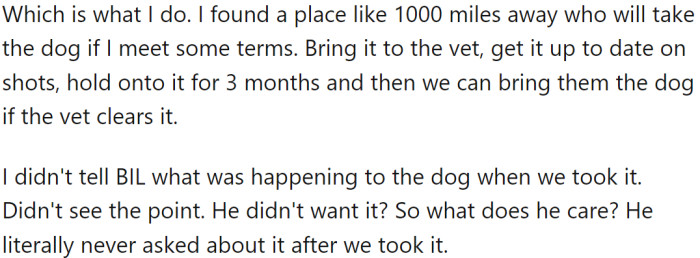
Her BIL was very angry
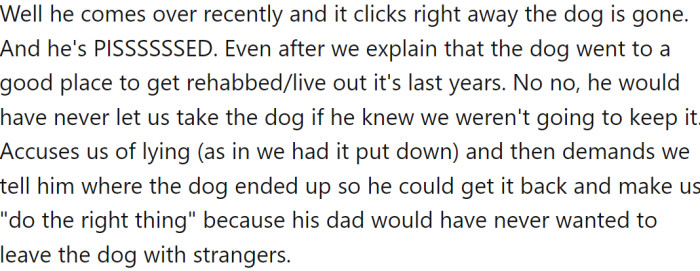
OP understands that grief makes you do strange things, but...
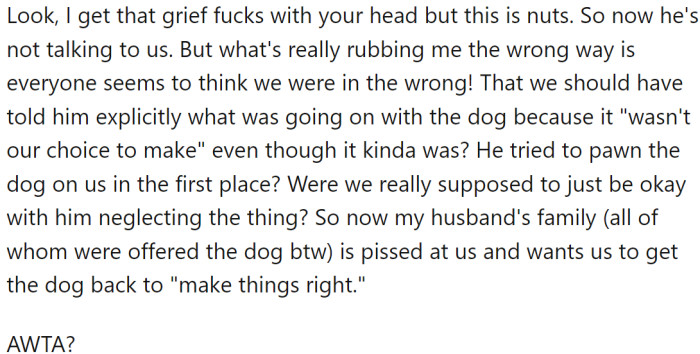
The phenomenon of grief-related decision-making is often linked to the concept of emotional dysregulation.
Dr. James Gross, a psychologist at Stanford University, has studied this extensively, revealing that emotional states can lead to impulsive actions that don't align with one's values or long-term goals.
In this case, the decision to rehome a pet may stem from overwhelming emotions rather than a rational assessment of the situation.
OP has offered the following explanation for why they think they might be the a-hole:
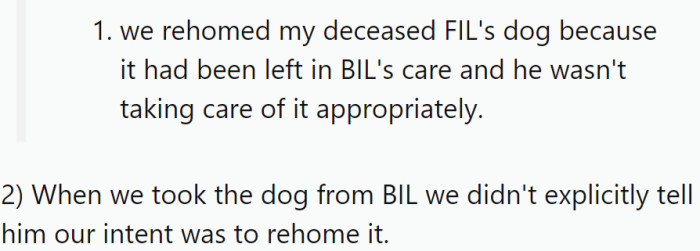
This Redditor was harsh on the husband
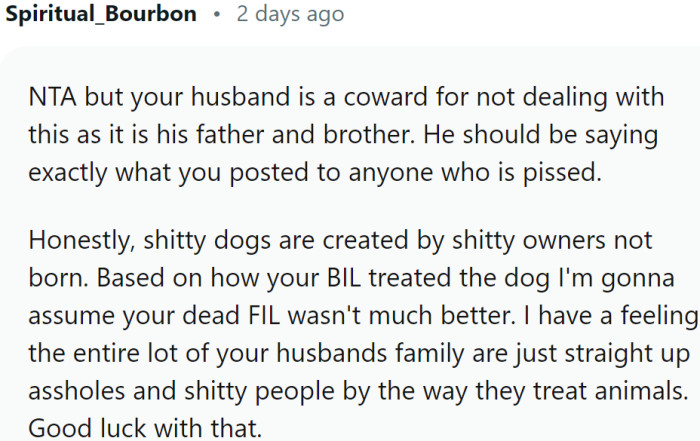
OP replied
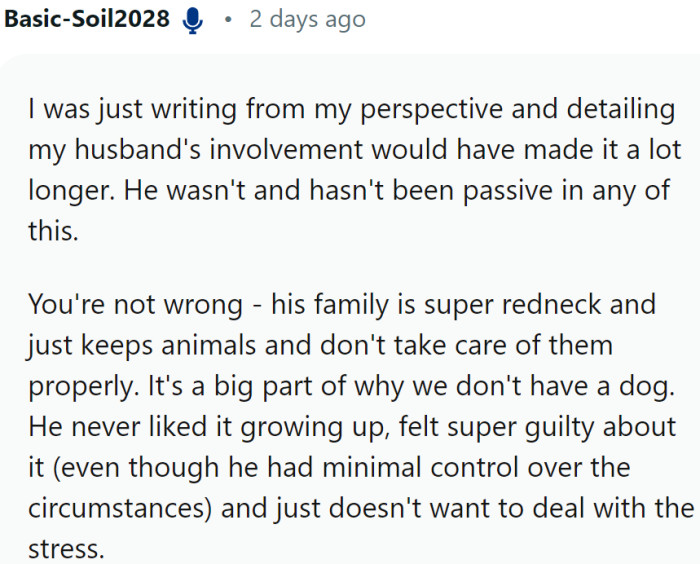
Navigating Family Disputes During Grief
Family disputes during periods of grief can create additional emotional strain, complicating already fragile situations.
Research shows that grief can elicit strong reactions that may lead to entrenched positions among family members.
According to studies in Family Systems Therapy, it's essential for families to communicate openly and compassionately during these times to mitigate conflicts.
This is a good point

All day, every day.
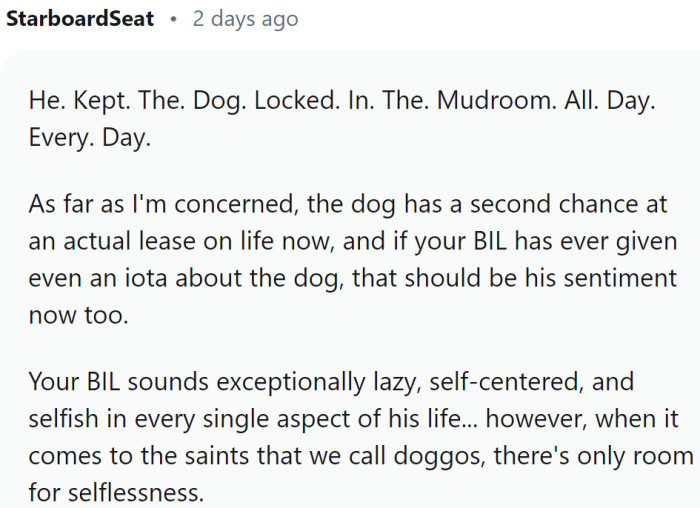
It is a blessing in disguise
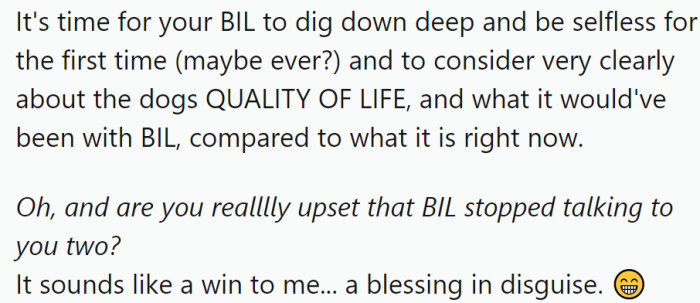
Therapeutic interventions, such as grief counseling, can also provide families with tools to navigate these complex emotions.
Studies indicate that grief counseling can help individuals process their emotions while improving communication within the family.
This approach fosters a supportive environment where family members can express their feelings and work towards resolution together.
This is good logic:
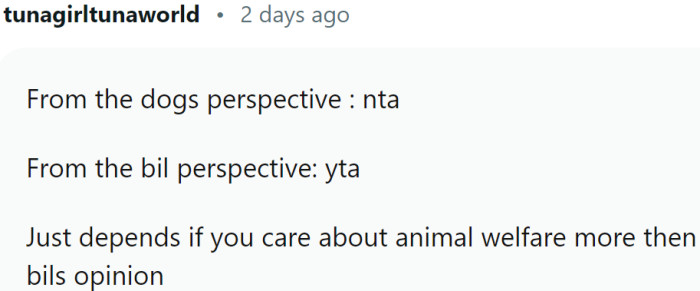
Clothes are a different thing.
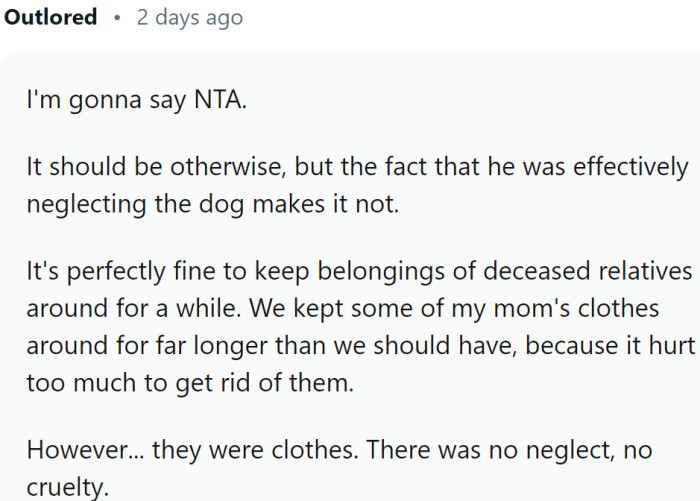
The bottom line is:
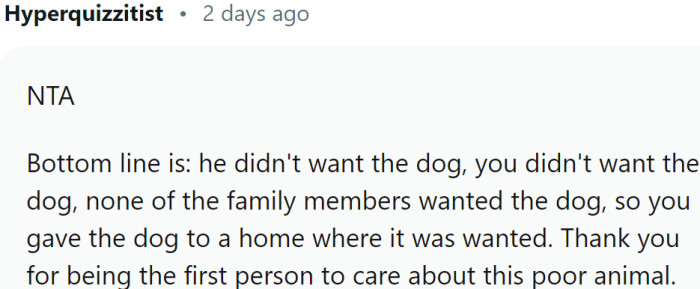
The Importance of Emotional Support
Providing emotional support during times of loss is crucial for individuals grappling with grief.
Research from the American Psychological Association emphasizes that social support can buffer the negative effects of grief, promoting resilience and emotional well-being.
Creating a supportive network can help individuals feel less isolated and more understood during their grieving process.
While this decision was made with the dog's best interests in mind, it was met with anger and resentment from family members who felt that OP had overstepped her bounds. They argued that it was not her place to rehome the dog and that it should have been left with someone in the family.
However, the reality is that when it comes to caring for a pet, their well-being should always come first. If a person is unable to provide the necessary care, it's important to find someone who can.
This is especially true when the animal's previous owner has passed away and cannot provide guidance or care. In the end, OP made a difficult but responsible decision by rehoming the dog.
While it may have caused tension with family members, she can rest easy knowing that she did what was best for the dog. It's a reminder that while we may hold onto things as a way to remember our loved ones, we must always prioritize the well-being of those in our care, whether they be human or animal.
Psychological Analysis
This scenario demonstrates how grief can cloud judgment and lead to decisions that may not align with an individual's typical values.
It's essential for family members to approach such situations with compassion and understanding, recognizing the emotional turmoil that accompanies loss.
Analysis generated by AI
Analysis & Alternative Approaches
Grief profoundly affects decision-making and interpersonal relationships, leading to actions that may seem irrational.
Research supports the importance of emotional support and open communication during these challenging times.
Ultimately, fostering understanding and compassion within families can help navigate the complexities of grief and strengthen familial bonds.



